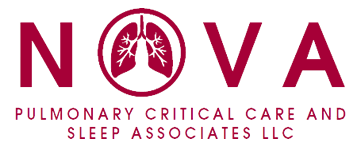
Shortness of breath is something most people experience at some point after a sprint up the stairs, during a workout, or while recovering from a cold. But what happens when it lingers? Or when it appears suddenly, without an apparent reason?
While occasional breathlessness may not be alarming, persistent or unexplained shortness of breath can be a sign of an underlying health issue, especially if it interferes with daily activities or quality of life. In such cases, consulting a lung specialist, also known as a pulmonologist, is an essential step toward understanding the cause and finding relief.
This article from Nova Pulmonary and Sleep, your trusted lung and sleep specialists in Vienna, Leesburg, South Riding, Ashburn, Broadlands, Brambleton, Fairfax, Tysons Corner, Chantilly, and Purcellville, VA, breaks down when you should see a specialist and what conditions might be contributing to your symptoms.
What Is Shortness of Breath?
Shortness of breath, also called dyspnea, is the feeling of not getting enough air into your lungs. It may feel like tightness in the chest, rapid breathing, or the inability to take a full breath. It can range from mild and temporary to severe and chronic.
You might experience shortness of breath:
- During physical exertion
- While lying down
- After minimal activity
- Even at rest
Occasional breathlessness may not require medical intervention, but it becomes a concern when it is:
- Persistent
- Progressive
- Sudden and unexplained
- Interfering with daily life
Common Causes of Shortness of Breath
Many conditions can cause shortness of breath. Some are related to the lungs, while others stem from the heart, anxiety, or even muscle function. Let’s take a look at the most common pulmonary causes that a lung specialist at Nova Pulmonary and Sleep can help diagnose and treat.
1. Asthma
Asthma is a chronic condition that causes the airways to become inflamed and narrow, making it difficult to breathe. Common symptoms include:
- Wheezing
- Tightness in the chest
- Coughing
- Shortness of breath, especially at night or during exercise
Asthma is treatable, but it requires proper diagnosis and management, typically with inhalers and lifestyle adjustments.
2. Chronic Obstructive Pulmonary Disease (COPD)
COPD includes chronic bronchitis and emphysema, usually caused by smoking or long-term exposure to lung irritants.
Symptoms of COPD include:
- Persistent cough with mucus
- Difficulty breathing
- Frequent respiratory infections
- Wheezing
If you are over 40 and have a history of smoking or exposure to secondhand smoke or air pollution, shortness of breath may be a warning sign of COPD.
3. Interstitial Lung Disease (ILD)
ILD refers to a group of disorders that cause inflammation and scarring of lung tissue, making it hard for oxygen to pass into the bloodstream.
Common causes of ILD include:
- Autoimmune diseases (e.g., rheumatoid arthritis)
- Long-term exposure to hazardous materials (e.g., asbestos)
- Certain medications
You should consult a pulmonologist if you experience progressive breathlessness along with fatigue or a dry cough.

4. Obstructive Sleep Apnea (OSA)
Many people don’t associate sleep disorders with breathing issues during the day, but untreated OSA can lead to daytime shortness of breath and fatigue.
Symptoms of sleep apnea include:
- Loud snoring
- Gasping for air during sleep
- Daytime sleepiness
- Morning headaches
At Nova Pulmonary and Sleep, our sleep specialists can conduct overnight sleep studies to diagnose and treat OSA, reducing the risk of heart disease and stroke.
5. Lung Nodules or Lung Cancer
Not all lung nodules are cancerous, but they should be evaluated, especially if you have a history of smoking or are over the age of 50.
Lung cancer can cause symptoms such as:
- Chronic cough
- Chest pain
- Coughing up blood
- Shortness of breath
Early diagnosis improves outcomes. If a lung nodule has been detected on imaging, a pulmonologist can assess its risk and recommend the next steps.
Non-Pulmonary Causes Worth Considering
Although this article focuses on pulmonary causes, other systems may be involved. These include:
- Heart conditions such as congestive heart failure or arrhythmias
- Anemia, which reduces the oxygen-carrying capacity
- Panic attacks or anxiety, which can mimic respiratory issues
- Deconditioning, particularly in people with sedentary lifestyles
That’s why a thorough evaluation by a lung specialist is so critical; they can identify or rule out pulmonary causes and collaborate with other specialists if needed.
Warning Signs: When to Seek Medical Attention
If you’re unsure whether your symptoms warrant a visit to a lung specialist, look out for these red flags:
- Shortness of breath that interferes with work, sleep, or daily tasks
- Breathlessness that occurs without exertion
- Chest tightness, pain, or discomfort
- Chronic cough or wheezing
- Swelling in your feet or ankles
- Frequent respiratory infections
- Difficulty breathing when lying flat (orthopnea)
- Gasping or choking during sleep
If you’re experiencing any of the above, especially in combination, don’t wait; early evaluation is key.
How a Pulmonologist Can Help
At Nova Pulmonary and Sleep, our team specializes in identifying and managing lung conditions and sleep disorders using a patient-first, evidence-based approach. Here’s what to expect when you visit:
Step 1: Comprehensive Evaluation
We begin with a detailed medical history, physical examination, and review of symptoms. We may also ask about environmental exposures, smoking history, and family history.
Step 2: Diagnostic Testing
Depending on your symptoms, we may recommend:
- Pulmonary function tests (PFTs)
- Chest X-ray or CT scan
- Oxygen saturation monitoring
- Sleep studies (home-based or in-lab)
- Bronchoscopy or biopsy if needed
Step 3: Personalized Treatment Plan
Once we have a precise diagnosis, we’ll craft a treatment plan tailored to your needs. This might include:
- Inhalers or nebulized medications
- CPAP or BiPAP therapy for sleep apnea
- Smoking cessation programs
- Lifestyle modifications
- Ongoing monitoring and follow-up care
Why Choose Nova Pulmonary and Sleep?
We are a leading provider of lung and sleep health services in Northern Virginia, offering:
- Board-certified pulmonologists and sleep specialists
- Convenient locations in Vienna, Leesburg, Ashburn, South Riding, and surrounding areas
- In-depth testing capabilities onsite
- Compassionate, individualized care
- Telemedicine appointments for added convenience
Our goal is not just to treat symptoms, but to restore your quality of life and provide long-term support.
Scientific References
To ensure accuracy and credibility, our approach is informed by reputable sources, including:
- American Thoracic Society: www.thoracic.org
- National Heart, Lung, and Blood Institute: www.nhlbi.nih.gov
- American Academy of Sleep Medicine: www.aasm.org
- Centers for Disease Control and Prevention: www.cdc.gov
Don’t Ignore Your Breath
Shortness of breath is your body’s way of signaling that something might be wrong. Whether it’s a sign of asthma, COPD, sleep apnea, or something more serious like lung cancer, the sooner you investigate, the better the outcome.
If you’re in Northern Virginia, including areas such as Vienna, Leesburg, Ashburn, Fairfax, Tysons Corner, South Riding, Broadlands, Brambleton, Chantilly, or Purcellville, Nova Pulmonary and Sleep is here for you.

Take the Next Step Toward Better Breathing
Breathe Easier with Nova Pulmonary and Sleep
If shortness of breath is affecting your life, don’t delay. Schedule a consultation with our experienced team today. We’re here to help you reclaim your breath and your well-being.
Call or visit us at: www.novapulmonary.com Accepting new patients | Most insurance plans accepted


